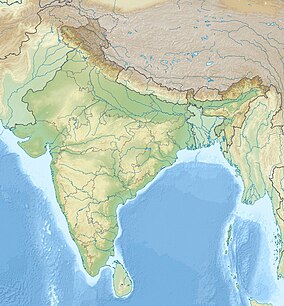Rajaji National Park
 From Wikipedia the free encyclopedia
From Wikipedia the free encyclopedia
This article needs additional citations for verification. (April 2012) |
| Rajaji National Park | |
|---|---|
| Location | Uttarakhand, India |
| Nearest city | Haridwar and Dehra Dun |
| Coordinates | 30°03′29″N 78°10′22″E / 30.05806°N 78.17278°E |
| Area | 820.5 km2 (316.8 sq mi) |
| Established | 1983 |
| Governing body | Principal Chief Conservator of Forests, Uttarakhand |
| Website | junglesafarirajajinationalpark |
Rajaji National Park is a national park and tiger reserve in the Indian state of Uttarakhand.[1] that encompasses the Shivaliks, near the foothills of the Himalayas. It covers 820 km2 (320 sq mi)[2] and is included in three districts of Uttarakhand—Haridwar, Dehradun and Pauri Garhwal. In 1983, three wildlife sanctuaries in the area (namely, Chilla, Motichur and Rajaji) were merged into one.[2]
Rajaji National Park was named after C. Rajagopalachari (Rajaji), a prominent leader of the Freedom Struggle, the first and last Governor-General of independent India and one of the first recipients of India's highest civilian award, Bharat Ratna (in 1954).
Tiger reserve status
[edit]The Union government has given the nod to a proposal to grant Rajaji National Park the status of a tiger reserve. It will be the second tiger reserve[3] [4] in the state after the Corbett Tiger Reserve, and 48th such reserve in India. As per directions of the Tiger Conservative Authority of India, Rajaji National Park will be a core area of the Rajaji Tiger Reserve, whilst about 300 km2 of the Shyampur range of the Haridwar forest division; furthermore, parts of Kotdwar and Laldhang forest division (which function as a buffer zone) will also be included in the project, augmenting the total area to 1150 km2.
Final approval was accorded to Kudremukh (Karnataka) and Rajaji (Uttarakhand) as tiger reserves on 15 April 2015.[5]
Flora
[edit]Rajaji National Park is nestled between the Shivalik ranges and the Indo-Gangetic plains. Broadleaved deciduous forests, riverine and riparian vegetation, scrubland, grasslands and pine forests form the range of botanical habitats in the park. The understory is sparse, and often absent, consisting of rohini (Mallotus philippensis), amaltas (Cassia fistula), shisham (Dalbergia sissoo), sal (Shorea robusta), palash (Butea monosperma), arjun (Terminalia arjuna), khair (Senegalia catechu), baans (Dendrocalamus strictus), semul (Bombax ceiba), sandan, chamror (Ehretia), amla Phyllanthus emblica, kachnar (Bauhinia variegata), ber (Ziziphus mauritiana), chilla (Casearia), bel (Aegle marmelos).
Fauna
[edit]

Rajaji National Park is at the northwestern limit of distribution for both the Indian elephant and Bengal tiger in India. The goral and the Himalayan tahr are also noteworthy residents, mainly staying on the precipitous, pine-covered slopes. Big herds of chital also inhabit the park, sometimes numbering as many as 250 individuals in a herd. Sambar, swamp deer, Northern red muntjac, Indochinese hog deer, nilgai, wild boar and sloth bear also occur in the park, and rhesus macaque and the common langur are fairly common. The Bengal tiger and Indian leopard are the prime predators in Rajaji National Park, apart from leopard cat, jungle cat, dhole, several viverrine species, Bengal fox, golden jackal and yellow-throated marten. The Himalayan black bear inhabits the higher reaches of the park. Other wild animals in the park include:
Over 315 species of birds are found in the park, whereas the wider region has over 500 species of birds, including both residents and migrants.[2]
The rivers which flow through the park harbour species of fish such as trout and mahseer.
Incidents
[edit]Rajaji National Park was in the news in April 2010 when a forest fire which started on the fringes of the park, spread out over a large area and threatened the Chandi Devi Temple.[6] There are also many leopards that are becoming man eaters leading to many man-animal conflict situations. Elephants require a very large area and they may wander into populated areas. Unfortunately, Rajaji is just outside the Indian city of Haridwar and there are many wild animals wandering in the city.[7]
References
[edit]- ^ "National Tiger Conservation Authority".
- ^ a b c Rajaji Official website of Haridwar.
- ^ "Rajaji becomes second tiger reserve in Uttarakhand – Hill Post".
- ^ "Rajaji Park notified as tiger reserve". The Hindu. 20 April 2015. Retrieved 8 October 2020.
- ^ "About - Rajaji National Park - Rajaji Tiger Reserve | Rishikesh".
- ^ Article, NDTV.com, 10 April 2010
- ^ "Early morning visitor from jungle breaks walls, crushes vehicles in Haridwar colony". Hindustan Times. 26 July 2020. Retrieved 23 November 2022.

